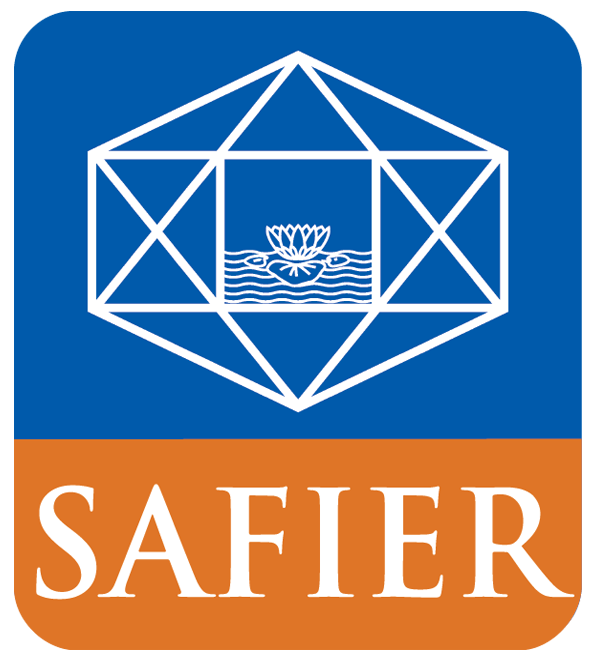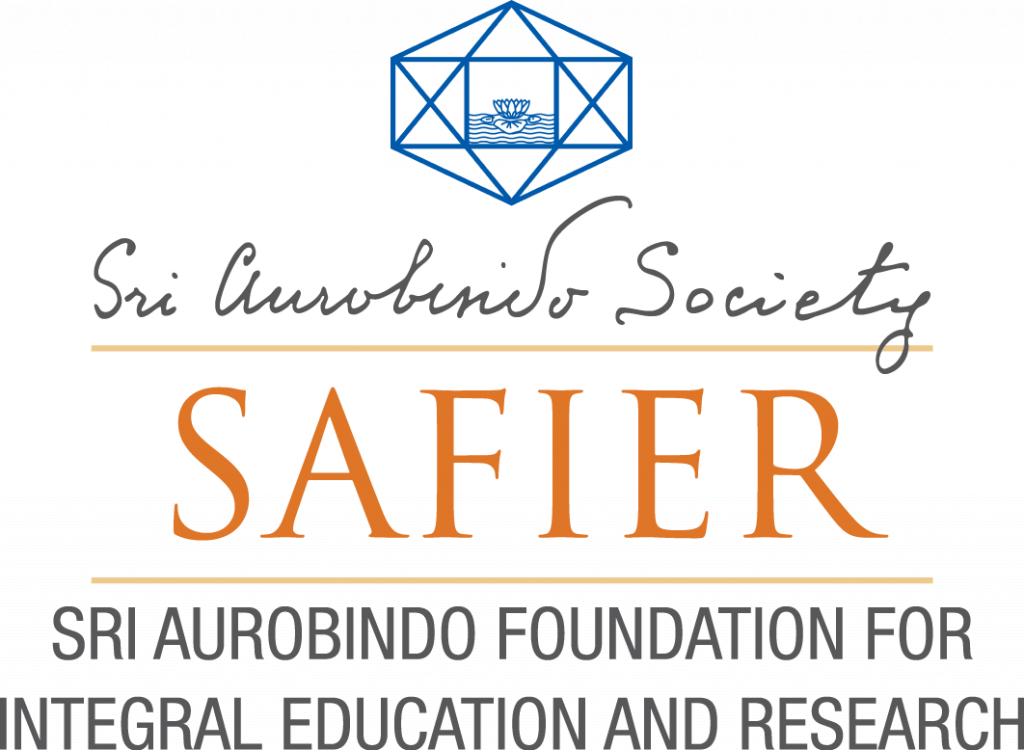Date: Nov 12 – 15 and 18, 2016
Location: Society House, Sri Aurobindo Society, Puducherry
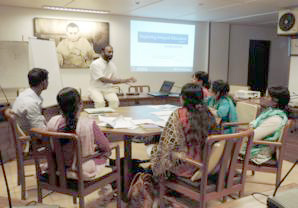 A series of orientation workshops were held for eight faculty members of Sri Aurobindo Siksha Kendra school at Bishnupur in South 24 Parganas, West Bengal, on November 12 to 15 and 18, 2016, at the Society House in Puducherry. The school, slated to start in January, 2017, is an initiative of Sri Aurobindo Society and Bishnupur Uchchal Probaho. Principles of teaching and multiple pragmatic approaches that can help implement education which helps facilitate a progressive and harmonious development of the spiritual, physical, emotional and mental aspects of students and teachers were part of this Integral Education camp. This Camp was based and designed on the Principles and Approaches of True Education as envisioned by Sri Aurobindo and the Mother.
A series of orientation workshops were held for eight faculty members of Sri Aurobindo Siksha Kendra school at Bishnupur in South 24 Parganas, West Bengal, on November 12 to 15 and 18, 2016, at the Society House in Puducherry. The school, slated to start in January, 2017, is an initiative of Sri Aurobindo Society and Bishnupur Uchchal Probaho. Principles of teaching and multiple pragmatic approaches that can help implement education which helps facilitate a progressive and harmonious development of the spiritual, physical, emotional and mental aspects of students and teachers were part of this Integral Education camp. This Camp was based and designed on the Principles and Approaches of True Education as envisioned by Sri Aurobindo and the Mother.
Various resource persons came forward to facilitate the workshops to bring about a basic understanding of Integral Education and helped participants explore several pragmatic ways and means of implementing education in its true sense in their lives and in the lives of students.
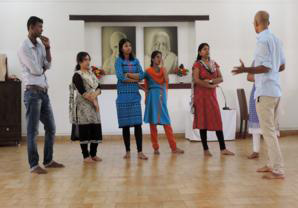 The Camp was inaugurated by Shivakumar, Director of India Council for Integral Education (ICIE). During his session on the first day, he distributed chits to all the participants with questions related to various aspects of education, in order to help them express and share their outlook on the deeper issues of education. He gradually led them to explore the three principles of True Education, as revealed by Sri Aurobindo, and shared with them how these could be applied in classroom interactions with children. He also discussed the importance of the role of teachers being examples of the values that they advocate, and the importance of creating an atmosphere of love and trust for the children. In Shivakumar’s concluding session, he shared 10 practices with all the teachers that would help them include aspects of Integration Education in their school. These practices contained ideas of working on oneself as a teacher or a facilitator; working with their fellow staff in the school; and also on creating a most conducive atmosphere in the schools where a deeply meaningful education can take place. He emphasized that these practices are also meant to strengthen each one to assume their respective roles effectively in their life.
The Camp was inaugurated by Shivakumar, Director of India Council for Integral Education (ICIE). During his session on the first day, he distributed chits to all the participants with questions related to various aspects of education, in order to help them express and share their outlook on the deeper issues of education. He gradually led them to explore the three principles of True Education, as revealed by Sri Aurobindo, and shared with them how these could be applied in classroom interactions with children. He also discussed the importance of the role of teachers being examples of the values that they advocate, and the importance of creating an atmosphere of love and trust for the children. In Shivakumar’s concluding session, he shared 10 practices with all the teachers that would help them include aspects of Integration Education in their school. These practices contained ideas of working on oneself as a teacher or a facilitator; working with their fellow staff in the school; and also on creating a most conducive atmosphere in the schools where a deeply meaningful education can take place. He emphasized that these practices are also meant to strengthen each one to assume their respective roles effectively in their life.
Following this, the workshop was taken forward by Ravi Shanker, 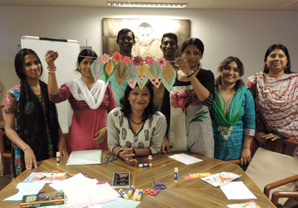 Creative Director for Theatre Arts in Integral Education at ICIE to help understand the whole process of Integral Education experientially via the application of theatre arts. He started the session with an interactive game of words to introduce the possibilities of using various elements of theatre arts to make the process of learning experiential and enjoyable. This was followed by another interactive session wherein he introduced all the participants to various theatre games to deepen their understanding of theatre as an educational tool. This process helped everyone to recognize the necessity of understanding their own selves first and then those with whom they share their journey of life. Once this step was achieved, he made the participants further understand their selves and the central ideal of education as envisioned by Sri Aurobindo and the Mother in a profound way via meta-cognition, impromptu enactments, weaving stories around a core value, stage-performance, open-forum, enquiries and reflections. During Ravi Shanker’s concluding session, all those attending recognized that profound understanding of the self in regard to body, mind, emotions and a spark within the “All Governing Supreme Force” is essential not only to be an ideal teacher but also to be an ideal human being.
Creative Director for Theatre Arts in Integral Education at ICIE to help understand the whole process of Integral Education experientially via the application of theatre arts. He started the session with an interactive game of words to introduce the possibilities of using various elements of theatre arts to make the process of learning experiential and enjoyable. This was followed by another interactive session wherein he introduced all the participants to various theatre games to deepen their understanding of theatre as an educational tool. This process helped everyone to recognize the necessity of understanding their own selves first and then those with whom they share their journey of life. Once this step was achieved, he made the participants further understand their selves and the central ideal of education as envisioned by Sri Aurobindo and the Mother in a profound way via meta-cognition, impromptu enactments, weaving stories around a core value, stage-performance, open-forum, enquiries and reflections. During Ravi Shanker’s concluding session, all those attending recognized that profound understanding of the self in regard to body, mind, emotions and a spark within the “All Governing Supreme Force” is essential not only to be an ideal teacher but also to be an ideal human being.
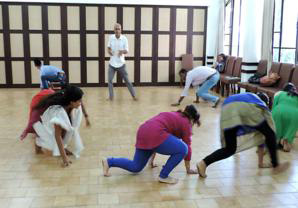 This vigorous action-packed series of activities that had all the participants energized was followed with concentrated, deeper and meticulous understanding of the Principles of Teaching by Kiran, Resource Facilitator for Art & Craft at ICIE via sessions on art and craft. She facilitated them to use the world outside the classrooms and connect with natures’ gifts such as flowers, leaves, stems and so on. This helped the participants experience for themselves how learning can be fascinating and enriching. During Kiran’s session, all participants learnt to use available materials to learn four operations of math; develop five senses; enhance creativity, pattern designs and others. With her they also explored craft punches and how to use them for developing different faculties and skills. In Kiran’s concluding session, while learning origami, they realized the significance of inner silence and how to help children grow integrally without disturbing their innate nature.
This vigorous action-packed series of activities that had all the participants energized was followed with concentrated, deeper and meticulous understanding of the Principles of Teaching by Kiran, Resource Facilitator for Art & Craft at ICIE via sessions on art and craft. She facilitated them to use the world outside the classrooms and connect with natures’ gifts such as flowers, leaves, stems and so on. This helped the participants experience for themselves how learning can be fascinating and enriching. During Kiran’s session, all participants learnt to use available materials to learn four operations of math; develop five senses; enhance creativity, pattern designs and others. With her they also explored craft punches and how to use them for developing different faculties and skills. In Kiran’s concluding session, while learning origami, they realized the significance of inner silence and how to help children grow integrally without disturbing their innate nature.
With this touch of inner silence as they came close to nature appreciating it as a beautiful teacher, they were taken further on this learning path with Sushanto Nath, an Artist and Resource Facilitator for Art in Education at ICIE. With him they got the opportunity to enquire deeper into the meaning of beauty and art, and how they can be taken up with children of different age groups both in and outside classrooms. With practical examples and activities, Sushanto demonstrated the significance of unbiased observation and how to identify the unique beauty of each child; and how by encouraging that unique beauty, teachers can help the child connect with their hidden potentials. In his concluding session, Sushanto Nath, along with Sagarika and Kiran, involved all the participants in various faculty development games that helped each teacher discover a child within themselves—a child who needs to develop various areas of human capabilities exponentially so that they can groom themselves into ideal teachers and human beings.
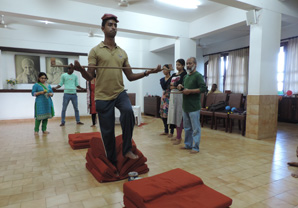 Finally, their journey that had started with an aspiration to comprehend True Education culminated with a session by Dr. Sampadananda Mishra, Director of Sri Aurobindo foundation for Indian Culture (SAFIC) as they took a plunge with him into the mystical ocean of Indian culture. Dr. Mishra explained the importance of Sanskrit, systematic arrangement of sounds in the Sanskrit alphabet, simple shlokas and songs, and especially how to introduce them in the school’s primary level. Following this, certain materials were distributed to the participants which they will use and introduce them in the school’s next session . . ..
Finally, their journey that had started with an aspiration to comprehend True Education culminated with a session by Dr. Sampadananda Mishra, Director of Sri Aurobindo foundation for Indian Culture (SAFIC) as they took a plunge with him into the mystical ocean of Indian culture. Dr. Mishra explained the importance of Sanskrit, systematic arrangement of sounds in the Sanskrit alphabet, simple shlokas and songs, and especially how to introduce them in the school’s primary level. Following this, certain materials were distributed to the participants which they will use and introduce them in the school’s next session . . ..
Our prayer is that this collective endeavour to implement an Education System that is integral continues progressively for the participating principals, teachers, parents and for those who gave of themselves as facilitators for this mission . . .
Summary of reflections and feedback of participants translated from the original Bengali
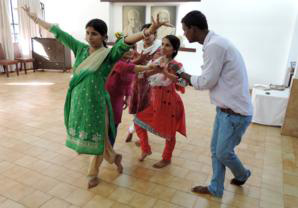 For all the participants, it was a delightful process of learning and unlearning and exploring the untapped possibilities within. It left them reverberating with immense joy, energy, confidence and inner motivation. They remarked that their renewed understanding of education, learning and teaching with love will definitely help them to be true examples of what they teach and thereby create a joyful and creative learning environment in their school and the world around them.
For all the participants, it was a delightful process of learning and unlearning and exploring the untapped possibilities within. It left them reverberating with immense joy, energy, confidence and inner motivation. They remarked that their renewed understanding of education, learning and teaching with love will definitely help them to be true examples of what they teach and thereby create a joyful and creative learning environment in their school and the world around them.
